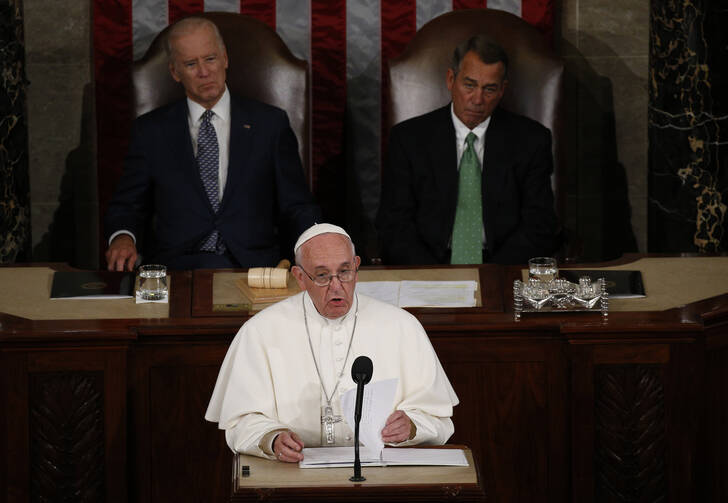Over at Talking Points memo, James Carroll reacts to Pope Francis’s address to Congress (full text here) with a recollection of the speech to the United Nations delivered by Pope Paul VI in 1965. Carroll’s father was a devout Catholic but also a high-ranking official in the Pentagon, and Carroll couldn’t help but ask him about the pope’s implied condemnation of American military involvement in Vietnam. Paul VI had even quoted John F. Kennedy (“Mankind must put an end to war, or war will put an end to mankind”), which could be read at an emotional appeal to American Catholics and as a swipe at Kennedy’s successor, President Lyndon Johnson.
Carroll writes that his father had a sharp rejoinder to the pope’s speech: “His Holiness does his job by holding up the ideal. We do ours by seeing how it applies in a specific situation, which assumes information and expertise His Holiness doesn’t have.”
Lots of people in Washington must be thinking something similar as the glow from Pope Francis’s speech wears off. A cynic would think of such “information” as polling numbers and fundraising totals (“Do you know how much money my opponent has with the election more than a year away?”) keeping members of Congress from acting on many of the issues raised by Francis, including economic inequality, climate change, abortion and the death penalty, and immigration reform. But some political differences are not only a matter of conscience, but also of advanced knowledge. The data can lead policymakers to different conclusions, for example, on the best ways to lift people out of poverty (direct assistance? tax credits? college-tuition assistance?).
Pope Francis did an effective job of directing our legislators’ attention to moral issues—or “holding up the ideal”—but they still face the daunting task of reaching a consensus when so many are wedded to different sets of facts. The sudden resignation of House Speaker John Boehner, just one day after the pope’s speech, underscores how difficult it is to govern in this atmosphere.








